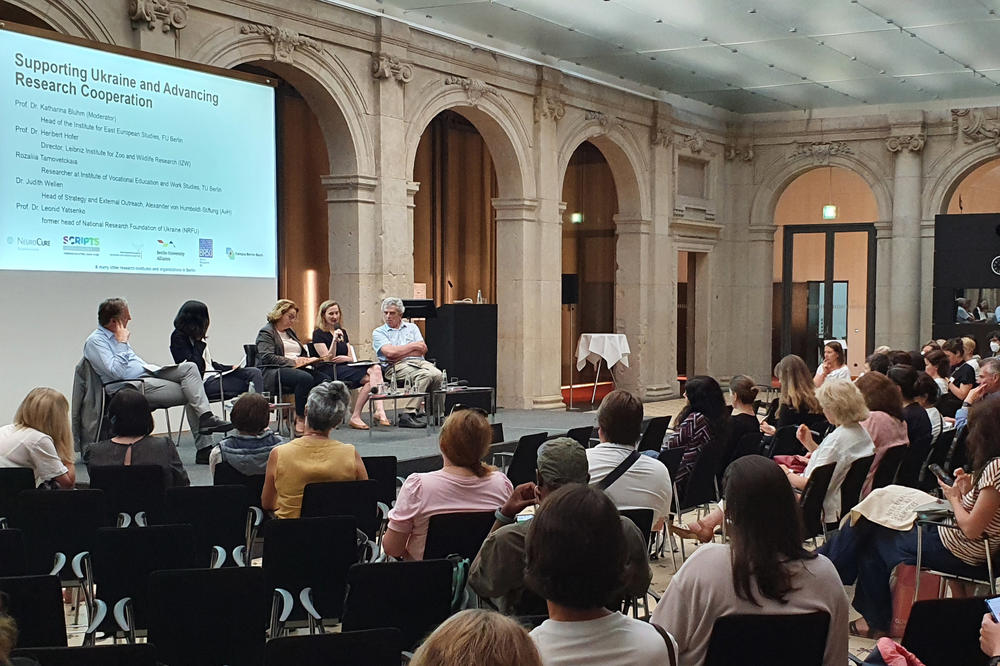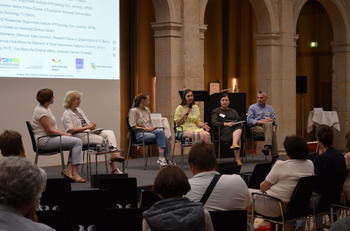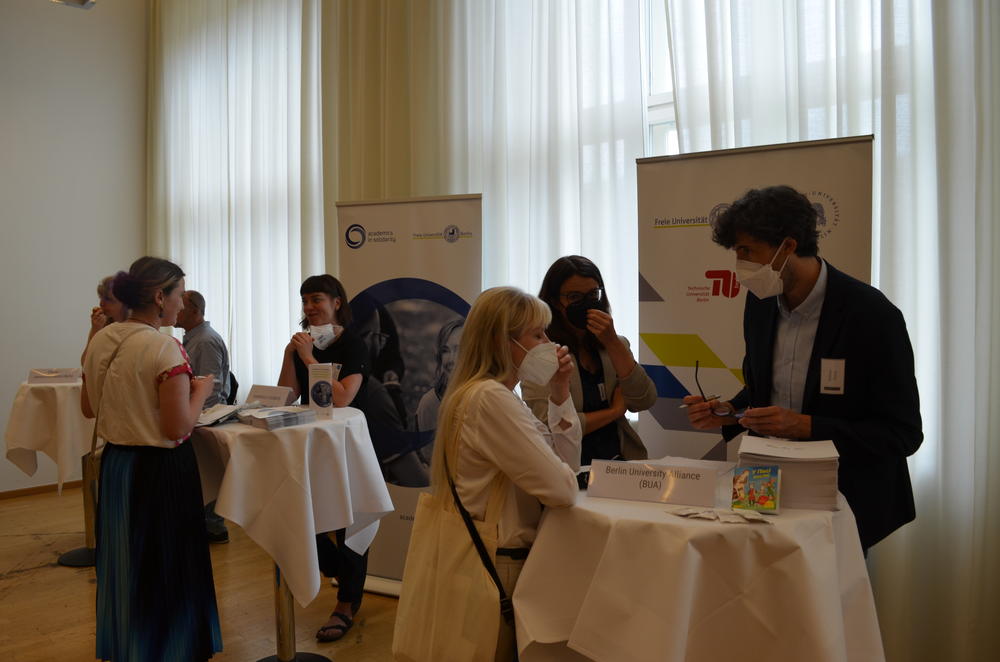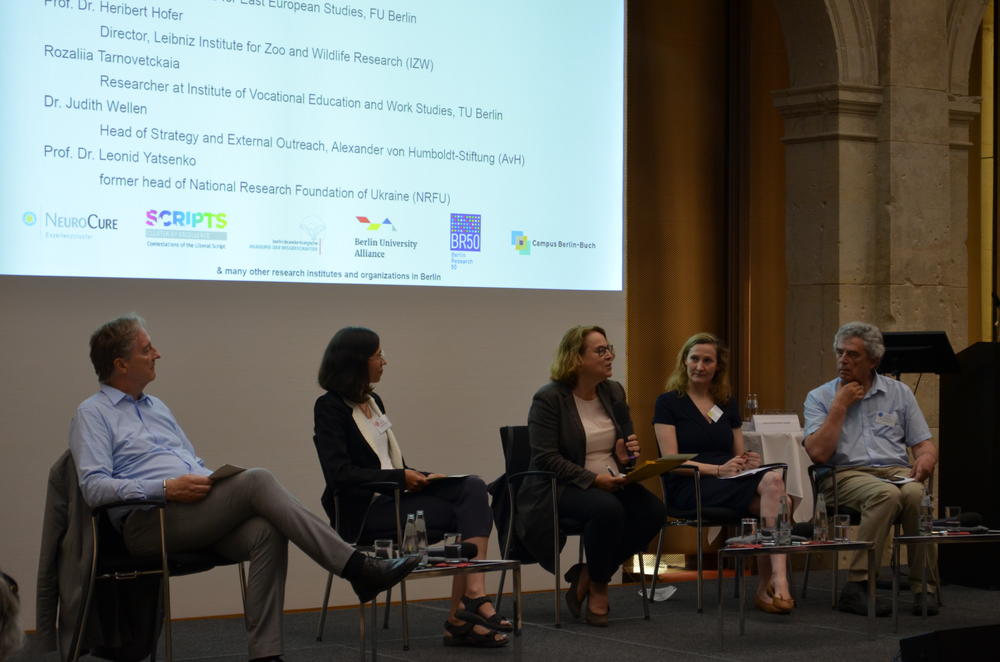Berlin4Ukraine
Networking Event Brings Together Refugee Researchers to Discuss Opportunities for German-Ukrainian Research Partnership
Jul 26, 2022
Some 100 interested scientists attended "Berlin4Ukraine: Meet & Learn" in the Leibniz Hall of the Berlin-Brandenburg Academy of Sciences and Humanities.
Image Credit: Gregor Hofmann/Anja Sommerfeld
"I am physically in Berlin and physically unharmed, but all my thoughts and feelings are at home in Ukraine," says sociologist Tetiana Kostiuchenko at the networking event "Berlin4Ukraine: Meet & Learn" at the Berlin-Brandenburg Academy of Sciences and Humanities (BBAW). Around 80 refugee scientists accepted the invitation from the Berlin Center for Global Engagement (BCGE) and the non-university research alliance Berlin Research 50 (BR50), among others, and the BBAW provided the premises and technology for the event. They were able to find out more about the academic system in Germany, meet researchers and institutions from the host country, and discuss the opportunities for Ukrainian-German cooperation.
In the panel discussion on "Eindrücke von ukrainischen Forschenden [Impressions of Ukrainian Researchers]", Tetiana Kostiuchenko summed up her three months in Berlin as "challenging" due to the "emotional disconnect," worries about family and friends in her home country, and uncertainty about when she would be able to return. The Cluster of Excellence Contestations of the Liberal Script (SCRIPTS) accepted the sociologist in March, and the researcher also has close contacts with the Institute for East European Studies at Freie Universität Berlin. She is grateful to her German colleagues for their solidarity and understanding when, on some days, she cannot manage her workload or is not feeling well psychologically – as was the case the day before, when at least 16 civilians died in a bombing of a shopping center in central Ukraine.
Challenging times: Ukrainian researchers share their experiences
Image Credit: Gregor Hofmann/Anja Sommerfeld
Exile as an Opportunity for Networking
Tetiana Kostiuchenko emphasizes that the Russian invasion is a threat to the academic system and the freedom of science in her home country, but also an opportunity to bring Ukrainian studies to the center of attention in Western Europe: The sociologist is pleased to report: "At Freie Universität's Institute for East European Studies, we are planning to integrate Ukraine into the curriculum, initially with a seminar on 'Understanding Ukrainian Society' in the winter semester." So far, Ukraine has only been considered abroad in the context of Russia, Georgia, Republic of Moldova. This now clearly proves to be wrong.
"Even if we are only in Germany temporarily, our stay can still be useful," agrees her colleague, Olga Kutsenko. The sociologist holds the Chair of Social Structures and Social Relations at the National University of Kyiv and is now a guest at Technische Universität Berlin. "I refer to Ukraine in my research as a 'laboratory' for modern European nation-building," she explains. The academic debate on the development of democracy in post-Soviet countries is very pronounced in Germany, she said. It would therefore be interesting for her to get involved here, for example in September at the annual congress of the German Sociological Association.
Her longer stay in Berlin this time had strengthened her view that there are great similarities between Ukraine and Germany in terms of value systems, lifestyles, and research interests. “This is a strong basis for collaboration between the two countries,” emphasizes Olga Kutsenko.
Similarities and Differences
There are differences, for example, in the fact that the regulations for PhDs in Germany are defined at the level of the faculties and not of the universities, as Oksana Seumenicht, a founding member of the German-Ukrainian Academic Society, notes. In her introduction to the German academic system, the specialist in molecular medicine explains, among other things, the connection between universities and research centers such as Max Planck or Helmholtz and presents foundations and other funding opportunities.
Numerous institutions, such as the Alexander von Humboldt Foundation, the German Academic Exchange Service (DAAD), and the partner institutions of the Berlin University Alliance (BUA), provide information about their services for researchers in exile during the afternoon, including in personal conversations. There is also time for exchange in three small groups: humanities and social sciences, natural sciences and engineering, and life sciences.
Although the financial situation at Ukrainian universities had already been weak even before the war began, there is a lot of research spirit and commitment, according to Taya Kozak, a doctoral student from Kyiv. She analyzes cell death in heart attacks and is participating in a study at her institute on the relationship between pneumonia and Covid-19 infections. "I was very disoriented when I suddenly had to leave the university in March due to the air raids and return to my home village. Two weeks later, I received a call from the supervisor of my doctoral thesis saying that the Max Planck Institute for Infection Biology would accept our entire research group," the microbiologist says. Being here with her friend and colleague Tetiana Laguta made a lot of things easier, such as finding housing in a foreign language they did not know they would ever need. For bureaucratic reasons, both are on leave from their home university for a year. But they thought about how they could continue their doctorate in Berlin now that the conflict has lasted longer than expected.
Discussions about the right kind of support for Ukrainian researchers
Image Credit: Gregor Hofmann/Anja Sommerfeld
Local and Host Country Support
Support in the right places without brain drain was the predominant topic at the final panel discussion on long-term perspectives. Katharina Bluhm, Professor of Eastern European Sociology at Freie Universität Berlin, was the moderator. Male scientists in exile are rare on this Thursday afternoon in Berlin-Mitte, one of them being Leonid Yatsenko, former head of the National Research Foundation of Ukraine (NRFU), the equivalent of the German Research Foundation (DFG). The professor of physics reports that Ukraine was on the verge of an academic reform that could have led to better funding of universities. This money had now gone into rearmament. He feared that after the end of the war, again only the applied sciences such as civil engineering or architecture would be funded. "Fundamental subjects such as physics, math, or biology could then fall by the wayside," says Leonid Yatsenko.
During the discussion, it became clear that there are numerous ideas on how to support Ukraine: 24-month study programs that begin locally in Germany and can be completed after the war in Ukraine ends, or bilateral degree programs. Distance scholarships in the form of non-residential fellowships to help researchers on-site are also under discussion, as is the opening of digital libraries and online resources for Ukrainian scientists.
A spontaneous vote shows that many of those present want to continue exchanging ideas and Gregor Hofmann, the moderator of the network meeting, asserted that there will be follow-up events.




